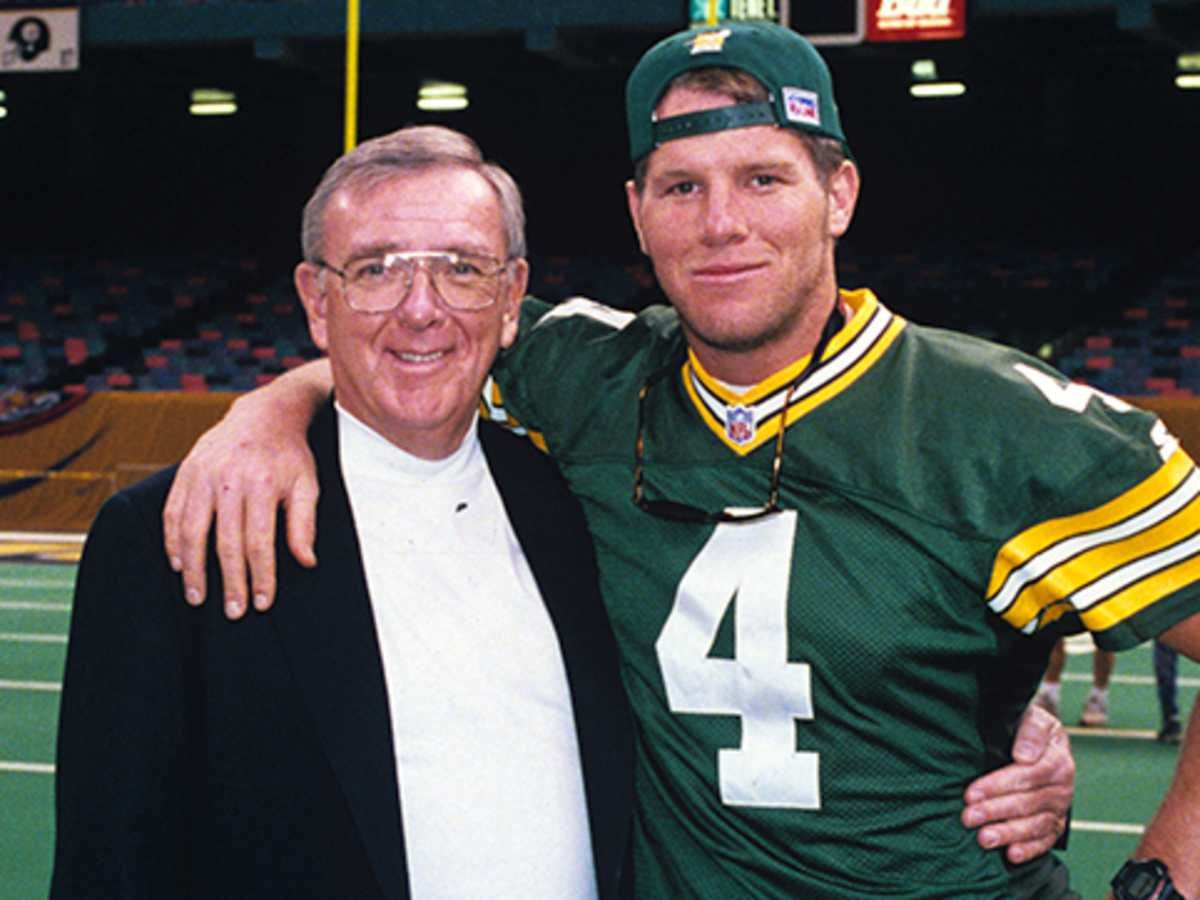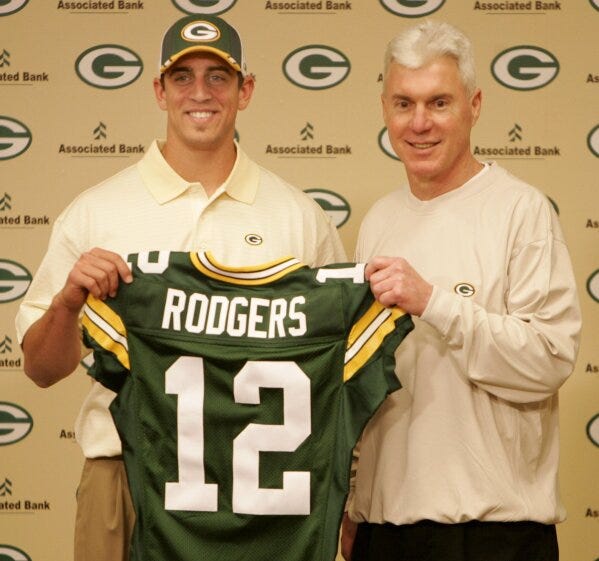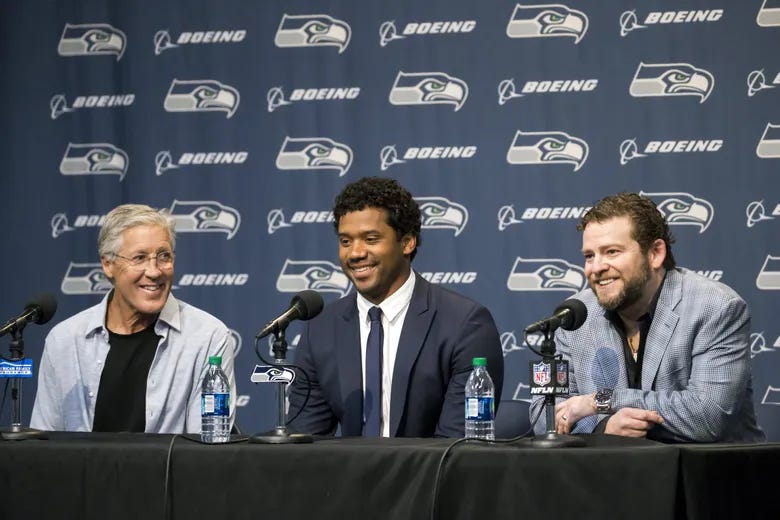Sam Darnold is Schneider's QB
There is no QBOTF coming through the draft this year
If the Seahawks draft a quarterback in the first two rounds, John Schneider will have made the biggest contradiction of his entire career to date this offseason. Not only because the GM has committed $65 million to Sam Darnold over the next two seasons (Seattle can release Darnold in 2026, but not without a significant financial penalty) but also by the fact that Schneider has now put a label on why so many quarterbacks fail in the NFL:
They don’t get enough reps and they don’t feel wanted by the organization.
If the Seahawks draft a quarterback in the first round, and even in the second round, it sends a direct message to Darnold that Seattle only sees him as a bridge quarterback. Though that didn’t seem to hurt Darnold in Minnesota last year after the Vikings drafted J.J. McCarthy, picking Jaxson Dart, Shedeur Sanders, or Tyler Shough next month would send a clear message — “this is going to be a competition sooner or later” — that is directly opposed to Schneider’s own philsophy on getting the most out of each quarterback.
In an interview with ESPN’s Mike Tannenbaum on Wednesday, Schneider and Bucs GM Jason Licht were asked a series of questions about the job of general manager. The one that stood out to me, because I think there is no other mission as important as quarterback hunting (I’ll get to that later) was Tannenbaum’s question about why so many quarterbacks fail in the NFL. A number that Schneider estimated was at least 80%.
“In my opinion, the reps. Guys need opportunities and they need the reps to be able to play and not be jumping around to different systems, different quarterback coaches. That’s hard. They’re basically learning a different language. Those guys are special. To sit in those meetings and watch what they’re learning? Pretty hard.”
Then Licht said that one of the reason Baker Mayfield has succeeded with Tampa Bay over other teams (including the Panthers, when he was teammates with Darnold), was that he felt like he was wanted there. To which Schneider emphatically agrees, “Yes!”
“There’s a psychological advantage to that, when they feel like they’re at a place where they’re wanted,” said Licht.
Then Schneider added, “And you have to evaluate the person that’s working with him too. Okay, are the (coaches) buying in?”
If the Seahawks draft Dart in the first round, or even Shough in the second round (despite a low rate of return, second round QBs are also usually treated like future starters), it does not send the message to Darnold that Seattle is fully committed to him as the starter. It does keep him looking over his shoulder for the entire season.
You may recall that at the end of last season, there were boos for Darnold and calls to make a change at quarterback in the playoffs if Darnold didn’t snap out of his “funk”…which was essentially one horrible start against the Lions to lose the NFC North title in Week 18 and then a poor start in Minnesota’s wild card loss to the Rams:
What are fans going to say in TRAINING CAMP if the Seahawks draft Dart and then Darnold has a few bad practices?
Adding a significant quarterback prospect to the roster between now and then would be the opposite of Schneider “buying in” to Sam Darnold. Seaside Joe tries to avoid absolute definitive predictions, but the odds of the Seahawks taking a quarerback in the top-80 seems to be less than 5%.
Even a third round quarterback might only be compared to Russell Wilson.
GMs live or die by quarterbacks
It’s easy for a general manager to get fired if he whiffs on the quarterback position, and hard for him to lose his job if he doesn’t. No “QB whispering” GM that I know of could ever be without work in the NFL. That type of executive is too rare.
Take Schneider’s old mentor Ted Thompson, for example. In fact, go back a step further than that:
Thompson’s mentor Ron Wolf got partial credit for the Raiders drafted Hall of Fame quarterback Ken Stabler while he was a scout for that organization. It helped him move up the ladder until he became the GM for the Packers in 1991, and less than a year into the job he traded for Brett Favre.
Wolf got to keep his job for the entire decade, winning a Super Bowl and getting immediately inducted into the team’s Hall of Fame when he stepped down in 2000.
The Packers, who had already tabbed Mike Sherman to replace Mike Holmgren as head coach, also gave Sherman the GM duties in 2000. That did not work and then Sherman was replaced by Thompson in 2005 after he had spent five seasons with the Seahawks as VP of football operations. That same year, Thompson drafted Aaron Rodgers with his first pick as a GM.
Thompson held the job for 13 seasons, won a Super Bowl, retired on his own terms, and was also immediately inducted into their Hall of Fame.
Now, answer this:
Do you think that Ron Wolf and Ted Thompson made just as many mistakes as any other GM?
I would guess that they probably did. Tons of mistakes. It’s a hard job. But they kept their jobs because they had Favre and Rodgers.
Pete Carroll was on the hot seat going into the 2012 season. If Pete was out, Schneider could precede or follow him out the door. That year, the Seahawks drafted Russell Wilson and Pete lasted for 14 seasons in Seattle. Schneider is going into his 16th season on the job.
Once the well dried up on the returns of the 2010-2012 draft classes, Pete and John made plenty enough mistakes to warrant being fired under other circumstances, but being able to point to Wilson and say, “We did that” made their arguments a lot stronger than if the Seahawks had changed quarterbacks three or four times after winning the Super Bowl.
I brought it up the other day, but Sam Darnold is essentially Seattle’s fourth starting quarterback since 2001. The Seahawks change quarterbacks as often as they’ve changed head coaches…
That’s not entirely a coincidence.
Schneider is committed to the Sam Darnold Seahawks and that’s going to continue until it’s abundantly clear that it has to end. GM’s live and die by their quarterback picks, but wavering on those decisions is career suicide.
Seaside Joe 2113





Meant to post the interview in the body of the article but forgot. It's in there now and here it is:
https://youtu.be/EWRGjA68T2Y?si=scn1FFHDJrKB5vwM
Quarterback being a position so significantly impacted by the psychology of the player, wouldn't a GM value having their QB1 relish competition in the position group?
I agree drafting a guy in the 1st or even 2nd round may be counterproductive if you believe you already have your guy, but not adding talent to the room for fear of messing with QB1-s head seems like poor management.